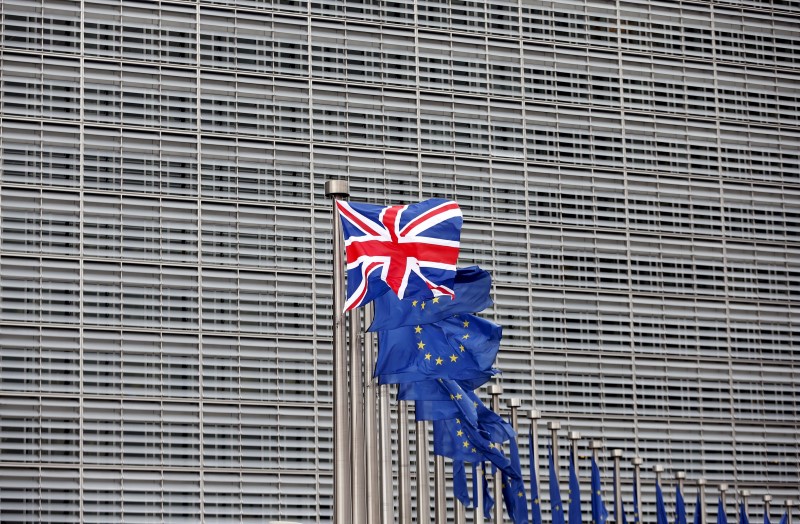By Kate Holton and Sarah Young
LONDON (Reuters) - The bosses at more than a third of Britain's biggest companies including oil giants Shell and BP and its largest telecoms group said leaving the European Union would put the economy at risk, backing Prime Minister David Cameron's call to stay in the bloc.
The business support provided a boost for Cameron in his battle to win over a divided public and confront the many euroskeptics in his own party before Britain holds a referendum on whether to stay in the EU on June 23.
It came the day after the pound posted its biggest one-day loss in almost six years on concerns Britain might vote to leave the 28-member bloc.
Nearly 200 companies, among them 36 FTSE 100 firms, including telecoms group BT (L:BT), retailers Marks & Spencer (L:MKS) and Asda (L:WMT), and oil firms Shell (L:RDSa) and BP (L:BP), signed the letter which put forward the economic merits of EU membership.
"Business needs unrestricted access to the European market of 500 million people in order to continue to grow, invest and create jobs," said the letter, published in the Times newspaper on Tuesday. "We believe that leaving the EU would deter investment, threaten jobs and put the economy at risk."
The high-profile backing for Cameron follows a tough few days since he agreed new British terms with EU leaders at a summit in Brussels last week when deep divisions in his Conservative party over Europe rose to the surface.
He suffered a major blow on Sunday when London mayor Boris Johnson, one of Britain's most popular politicians, said he would campaign for a British exit, and on Monday he was forced to mount a defense of his deal in parliament in the face of criticism from some of his own lawmakers.
Johnson, who as mayor presides over one of the world's pre-eminent financial centers, dismissed the significance of the letter from the business leaders.
SPREADING ALARM
"There will be people who try to spread alarm, anxiety," he told reporters, saying the same people had been wrong over Britain's decision not to join the euro and to exit the European Exchange Rate Mechanism 20 years earlier.
Other commentators said the potential boost for Cameron was limited given that two-thirds of top bosses had not signed up, including those from its two biggest retailers.
Tesco (L:TSCO), Britain's biggest private employer with 310,000 staff, said the referendum was a decision for the people of Britain and that its focus remained on serving its customers, while Sainsbury's (L:SBRY), the country's second biggest supermarket, said it was an apolitical organization.
"I suspect that the numbers (of FTSE 100 bosses) giving support to remain publicly have been a disappointment," said Andrew Hawkins, founder of polling firm ComRes.
In another survey published by the Institute of Directors on Monday, six in 10 of nearly 700 of its members polled said they planned to vote to stay in the EU.
SCOTTISH EXPERIENCE
"I can tell you this, if the leave campaign could produce 35 business leaders of this sort of stature, they'd be over the moon," Cameron said of the business leaders' letter during a visit to Slough, west of London.
"This is simply people running some of the largest businesses in our country that employ over a million people between them, saying this has real consequences for our country."
Economic concerns played a role in the Scottish independence referendum in 2014, when in the weeks ahead of the vote, big companies warned about the impact of leaving the UK on investment and jobs, adding to a climate of fear, and possibly swaying some votes to help keep that union in tact.
As a result some voters pledged to boycott firms wading into politics, and perhaps wariness from that experience deterred some of Britain's biggest employers from signing the letter.
Cameron's move to call on the voice of big business - the letter was arranged by his Downing Street office alongside the 'Britain Stronger in Europe' campaign - was not without risk as "Out" campaigners cast the EU as the instrument of a global elite which is out of touch with ordinary Britons.
Jim Mellon, a fund manager who is helping fund the "Out" campaign, told the BBC the signatories were mostly people who had "crawled their way up the corporate ladder" rather than "true entrepreneurs" who had started new businesses.

The stakes are high in the June referendum. A vote to leave would not only transform Britain's future in world affairs but also shake the EU, which has struggled to maintain unity over migration and financial crises, by ripping away its second-largest economy.